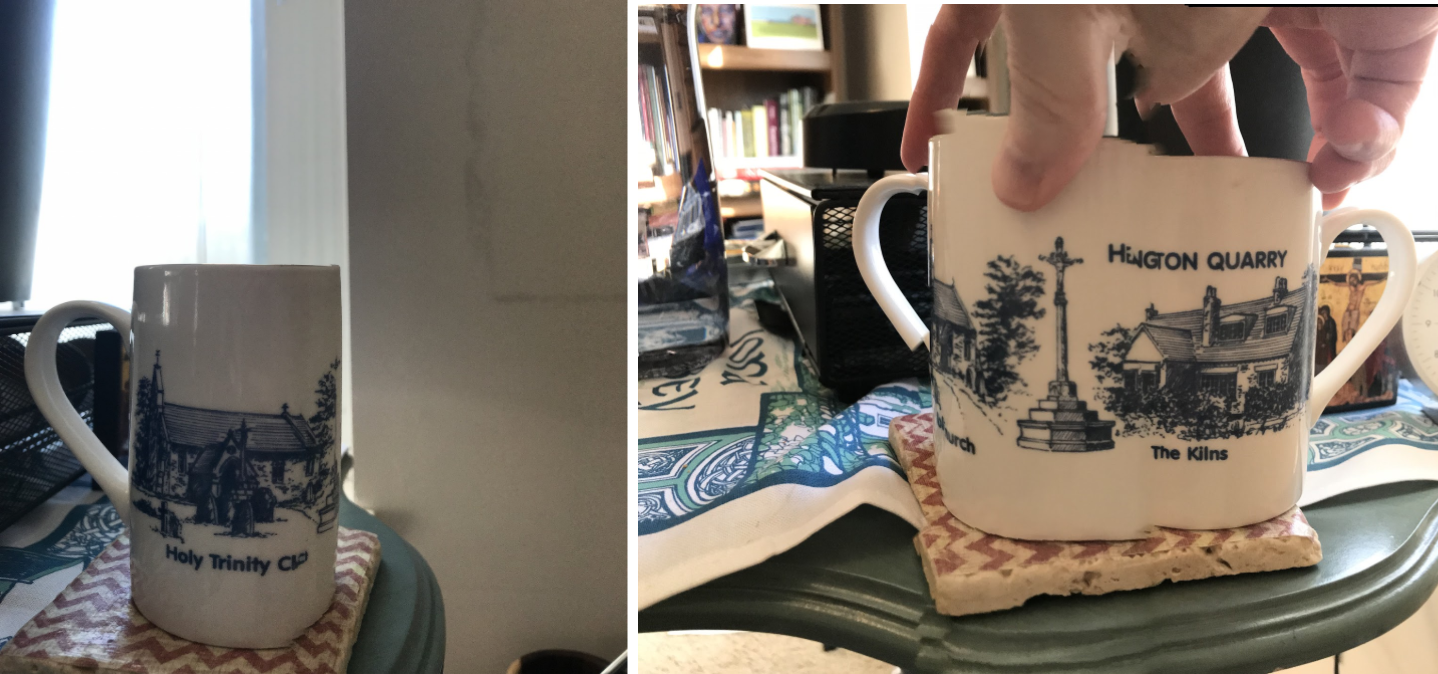This morning, you get a picture of my tea mug. For whatever reason, this feels like more of a tea mug than a coffee mug, so I’m enjoying some maple black tea this morning.
This mug has art 360 degrees, so I tried to take a panoramic picture… did not go well. But I thought the pictures were funny, so here they are.

As you can vaguely make out in my attempt of Salvador Dali photography, this mug has a painting of a church and a house. But not just any church and house, but two very near each other in Headington Quarry—a subdivision of Oxford, England. I got this mug at the church—Holy Trinity church—where C. S. Lewis attended. The house, known as “The Kilns,” is where Lewis most of his life. If you ever make it to Oxford and are a Lewis fan, make sure to go out and see his house, his church, and his burial site. It’s a pilgrimage for fans of Lewis!
—
Happy Easter! I may be a day late, but we are officially in Easter season. The fasting of Lent gives birth to celebration—He is risen, He is risen indeed!
Grant, we pray, Almighty God, that we who celebrate with reverence the Paschal feast may be made worthy to attain to everlasting joys; through Jesus Christ our Lord, who lives and reigns with you and the Holy Spirit, one God, now and for ever. Amen.
As I explained on Friday, our Philippians passages line up well with Good Friday and Easter. On Friday, we reflected on the death of Christ and our forgiveness. The passage today reads,
9Therefore God also highly exalted him and gave him the name that is above every name, 10so that at the name of Jesus every knee should bend, in heaven and on earth and under the earth, 11and every tongue should confess that Jesus Christ is Lord, to the glory of God the Father.
(Philippians 2:9-11)
The first word of the passage is “Therefore.” You might have heard that old Biblical studies dictum: “when you see a therefore, ask what it’s there for.” Very clever… In this case, it does help to ask “what it’s there for.”
In the first half of this hymn or poem, Paul outlined Jesus’ humiliation. His humiliation, first, in becoming a man and, second, in dying—the last line is “even death on a cross.” Then a shift happens. “Therefore,” Paul says… that is, on account of that humiliation, on account of Jesus’ taking on the form of a slave, on account of him becoming obedient to death, even death on a cross…
“Therefore, God also highly exalted him and gave him the name that is above every other name.”
Paul doesn’t mention resurrection explicitly, but the theme—on the other side of humiliation and death—is exaltation. The Greek word is huperupsoō, which means literally to raise to a point of honor or an elevation of status.
If you paid close attention on Friday, some alarm bells should be going off. Paul has just said Christ “humbled himself” (v. 8), the Greek meaning literally to lower, or lower one’s status. This is a vivid image of first lowering to the lowest point anyone could go before being raised to the highest point anyone could go.
In short, you don’t get Easter without Good Friday. You don’t get the resurrection without the cross.
We too often try to skip Philippians 5:5-8 in our own lives. We’re all too eager to follow Jesus out of the grave on Easter Sunday, but we’re not too keen on following him to the cross on Good Friday. The two, as Paul does here, are explicitly connected.
The cross makes resurrection possible, and now we are raised with him if we also die with him.
Paul continues: not only is Jesus raised and exalted, but he is worshipped by all of creation. Every knee should bow and every tongue confess that Jesus is Lord. In our time and place, it’s difficult to imagine the radical nature of this statement. Keep in mind that Judaism, and therefore Christianity, are fiercely monotheistic faiths. There was one God, and one Lord—and only one.
The radical nature of what Paul is saying can be illuminated a bit in this passage from Isaiah 45:18-23,
For thus says the LORD,
who created the heavens
(he is God!),
who formed the earth and made it
(he established it;
he did not create it a chaos,
he formed it to be inhabited!):
I am the LORD, and there is no other.
19I did not speak in secret,
in a land of darkness;
I did not say to the offspring of Jacob,
“Seek me in chaos.”
I the LORD speak the truth,
I declare what is right.
20Assemble yourselves and come together,
draw near, you survivors of the nations!
They have no knowledge—
those who carry about their wooden idols,
and keep on praying to a god
that cannot save.
21 Declare and present your case;
let them take counsel together!
Who told this long ago?
Who declared it of old?
Was it not I, the LORD?
There is no other god besides me,
a righteous God and a Savior;
there is no one besides me.
22Turn to me and be saved,
all the ends of the earth!
For I am God, and there is no other.
23By myself I have sworn,
from my mouth has gone forth in righteousness
a word that shall not return:
“To me every knee shall bow,
every tongue shall swear.”
Sound familiar? Paul has just said that every knee will bow and tongue confess that Jesus—the one who died a humiliating death—is Lord. To borrow some words from Isaiah, it is through this man that all should “turn to” and “be saved”—”there is no other.”
Paul has no shame in saying that Jesus, the one humiliated, is exalted and, yes, even divine. It is only because of this fact that our salvation is possible. It is through Christ, and through him only, that we are saved.
In closing, reflect some on this statement from 4th century church father, Athanasius:
The glory of the Father is that the human race not only was created but was re-created when lost. It was given life once again when dead, so as to become a renewed temple of God. For the powers in heaven also, the angels and the archangels, worship him and now worship the Lord “in the name of Jesus.” This joy and exaltation belongs to human beings, because the Son of God, having himself become a human being, is now worshiped. The heavenly powers are not offended when they behold all of us being led into our heavenly abode as we share in his body. This could not have happened in any other way. It happened only because, “being in the form of God and taking the form of a slave, he humbled himself,” agreeing to assume our bodily condition “even to death.”
Grace and peace, see you tomorrow!



